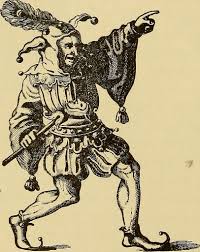Note to Twelfth Night, 5.1,20-23, "so that, conclusions to be as kisses, if your four negatives make your two affirmatives, why then, the worse for my friends and the better for my foes"
In general, the Clown is sticking to his main point—it is better to be honestly told off by your foes than dishonestly flattered by your friends. However, his comparisons have been subject to many interpretations. Here are some:
-
The "four negatives" are the four lips of two quarreling lovers. The "two affirmatives" are the same two lovers who have kissed and made up. Therefore, as in a lovers' quarrel, negatives produce positives, and the Clown is better served by his foes than by his friends.
-
"Four negatives" refers to a coy young lady's "no, no, no, no," which really means "not no" twice, or "yes, yes, I really want to be kissed." This shows that what is meant is the opposite of what is said, so that when the Clown's foes say that he is an ass, they mean the opposite.
- When lips say the "oh" of "no" they're in kissing position (rounded and puckered), so everything contains its opposite, including the opinion of his foes that the Clown is an ass.
- It's all grammatical. A double negative makes an affirmative, so two double negatives makes two affirmatives, which means that the bad things that are said by the Clown's foes are worth twice as much as the good things, but they (the bad things) are really good things.
A few words of caution: The Clown is a "corrupter of words" (3.1.36), so when he says something it's supposed to be intriguing and amusing, not perfectly clear.

